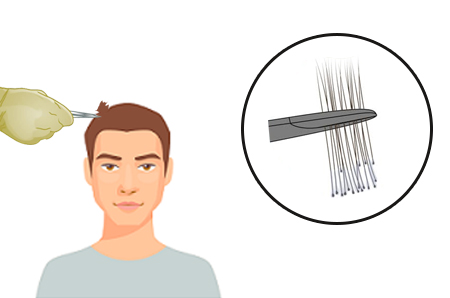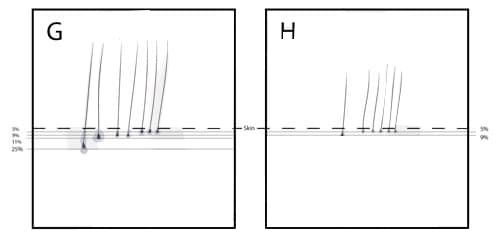Male pattern Hair loss happen due to two reasons, Genetics and DHT. If one of the factors are missing, male pattern hair loss does not occur.
GeneticsIf parents have hair loss, there are more chances of hair loss in children. The hair loss genes can pass on to children from either parent. If hair loss gene testing is positive, it does not mean the individual will must go through hair loss. Only if it gets activated, then the person will go through hair loss. At what age the hair loss gene gets activated, it cannot be predicted. If hair loss gene gets activated at younger age, the hair loss is faster due to higher levels of DHT at younger age.
DHTDHT stand for Di Hydro Testosterone, it's a one of the Male hormone, important for the development of secondary Sex characters. After age 18, DHT is not needed. The DHT level in the body is very high in twenties and thirties. The DHT level gradually gets reduced in forties and fifties and the level is extremely low in sixties. Higher DHT level leads to faster hair loss in individuals with genetic predisposition for hair loss. Higher or lower DHT does not damage the hair, if there is no genetic predisposition for hair loss.
How DHT is formed in the Scalp Hair
There are two pathways.
- Direct pathway
- Alternate pathway
The circulating male hormone testosterone in the blood vessels is derived mainly from the testes and adrenal glands. In the blood vessels more than 97 % of the testosterone is bound to plasma protein and cannot cross the blood vessels walls due to its size. 3% of the male hormone circulates in the blood as free male hormone, due to its small size it can cross the blood vessels walls in to the tissues including scalp tissues. In the scalp tissues male hormone testosterone enter into hair follicle cells mainly the papilla cells, outer root sheath cells and sebaceous gland and get converted into DHT (Di-hydro-testosterone) by an enzyme 5 alpha reductase. There are two types of 5AR. Type 1, 5AR located in the pilosebaceous unit and sebaceous gland in hair, Type 11 5AR found in the outer root sheath and dermal papilla of the scalp hair.
Action Of DHT In Individuals with Genetic Predisposition For Hair LossThe DHT in the outer root sheath cells, papilla cells and pilosebaceous cells of hair bind to Androgen Receptors in the cytosol. This DHT Androgen receptor complex is able to enter into the cell nucleus and bind to DNA , it leads to production of cell specific messenger RNA ,which help in the synthesis of specific follicle damaging proteins.The clinical effect of DHT through the formation of specific follicle damaging proteins , leads to the progressive miniaturization of hair with each successive hair cycle, the end result is, the terminal hair become intermediate and finally Vellus ( thin short and hypopigmented with diameter less than 0.03 mm with bulbs located in the upper portion of the dermis )and eventually are lost. The process of progressive miniaturization and hair loss takes only few years, if the hair loss gene get activated during 20's and 30's due to higher levels of DHT. The process of miniaturization and hair loss takes decades if hair loss genes get activated in 50's due to decreased level of DHT at this age. In progressive miniaturization hair diameter and hair depth gradually get reduced .One thing is constant, Telogen hair depth is 45% of its respective anagen hair. If terminal anagen hair diameter is 0.07 mm and its depth is 4 mm, its telogen diameter is same and depth is 1.8 mm. If vellus anagen hair depth is 2 mm, its telogen depth is 0.9 mm.
Alternate PathwaysTestosterone can get converted into DHT in the blood circulation. The circulating DHT in the blood enter in the tissues including scalp tissue. In the scalp tissue DHT enter into hair follicle cells, mainly the papilla cells, outer root sheath cells and sebaceous gland cells. DHT might bind to different receptors rather binding to Androgen Receptors in the cytosol of papilla cells , outer root sheath cell and sebaceous gland cells and enter into the nucleus and bind to the DNA leads to production of cell specific mRNA and synthesis of specific proteins that lead to progressive miniaturization of hair and hair loss. As these alternate pathways does not involve 5 alpha reductase, finesteride is not effective.
Hair Loss DiagnosisSurface area of the scalp is approximately 80 inches square or 500 centimeter square. Each square inch has an average 1200 hair or each centimeter square has 200 hair. The average number of hair on the head is 100,000. If we randomly loose 50 % of the hair in any area, we still look fuller, neither we ourselves know we are balding, neither friends nor loves one know we are balding. This let us drift to a point where little bit further hair loss can make us look thin. Due to this deceptive nature of hair loss, it's important to have hair loss test if you have a family history of hair loss or you think you are losing hair more than average.
Accurate diagnosis of Hair loss can only be made by examination of plucked hair under microscope. If the person looks full head of hair but wanted to know surely about his hair loss status, the only sure way to know the hair loss status is by Hair Loss Test.

Approximately 50 hair are grasped in a special surgical clamp and hair are quickly jerked out of the scalp. The goal is to obtain telogen count. If 5 hair roots are found with average depth of 2 mm. It's normal out of 50 hair. If 15 hair out of 50, have hair root depth of 2 mm, it's means 30% hair are in Telogen Phase, which represent the beginning of hair loss. If this person is advised to take finasteride 1 mg tablet daily and apply Minoxidil 5% twice daily, the process of hair loss can get reversed without surgical intervention, what an amazing recovery, if we take early action.
Severity Of Hair LossDifferent degree of severity can be confirmed by the hair loss test
Normally 90 % of the hair are in Anagen stage and only 10 % in Telogen stage ( subset A )
In male pattern hair loss, DHT induced miniaturization take place . If telogen count increases to 30%, it represents the beginning of hair loss (subset B).

As the hair loss progress, gradually the terminal hair become intermediate, (subset C), there are 6 terminal left and 4 has become intermediate. Out of 6 terminal, 4 are in Anagen stage while 2 are in Telogen. It reflects 33% are in Telogen. Intermediate hairs are 4 and one has become telogen, it reflects 25 % are in telogen. Both Terminal and intermediate has increase percentage of telogen, which represent active hair loss.
With further miniaturization, more and more terminal hair become intermediate and the intermediate hair become vellus hair. In subset D, only 3 termial hair are left, 3 are intermediate, 4 has become vellus. 33% are in telogen stage for terminal and intermediate hair. 50 % of the vellus hairs are in telogen stage. Subset D shows active fast hair loss.

In subset E, there is no terminal hair left, 2 are intermediate and remaining 8 are vellus of different sizes. Out of two intermediate one is telogen, it reflect 50 % are in telogen stage. Among the 8 vellus hair, four vellus hair has relative higher diameter and four has less diameter. Higher diameter vellus has 50 % telogen hair. Less diameter vellus also has 50% telogen. 50% telogen among intermediate and both type of vellus reflect very fast hair loss.
In subset F all are transformed into vellus. There are two different types of vellus, first one has the larger diameter, the second one have smaller diameter. First group consist of 4 larger diameter hair. Among the First group of 4 vellus hair, 2 are in Anagen stage and 2 are in Telogen stage. Among the Second group of vellus hair, 3 are in Anagen stage and 3 are in Telogen stage. Total 50% of the hair are in Telogen stage. The numbers of hair are still 10. The Second group of Telogen has the tendency to fall out and not grow back and can lead to irreversible Hair Loss .This progressive miniaturization reflect very fast hair loss with irreversible tendency.

In subset G, there are 7 Vellus hair, one of them is in Anagen stage and six of them are in Telogen stage. 84 % of the hair are in Telogen stage .As we started with 10 hair and left with 7. We have already lost 3 hair permanently and these Telogens has the higher tendency to fall and not to grow back. Subset G is irreversible very fast Hair Loss.
In the final subset H the progressive miniaturization has lead to finest vellus hair. Four hair out of ten are permanently lost. One of the vellus is in Anagen stage and five of them are in telogen stage. 80 % are in telogen stage but these telogens have very very high tendency to fall out and not to grow back. Subset H is irreversible extremely fast hair loss.
Prognostic Use of Hair Loss TestHair loss test is also good for evaluating the effectiveness of hair loss medical treatment. Hair loss test is performed at three different parts of the scalp and its severity is recorded. For example if at one part of scalp out of 50 plucked hair, 20 are terminal anagen, 10 are terminal telogen , 10 are intermediate anagen and 10 are intermediate telogen. Once the treatment is started after six month hair loss test is repeated at the same part of the scalp and treatment effectiveness can be accurately determined.
Another misnomer is donor area permanence. In individuals going through hair loss, donor area also shows hair loss process on hair loss test. Hair loss FDA approved medical treatment also reverse the hair loss process in the donor area.
Medical TreatmentOnly FDA approved medical options work well in the male pattern hair loss. There are only two FDA approved medical options.
- Topical Hypertrichotic agents
- Oral anti androgens
Minoxidil a potassium channel opener and a vasodilator, was approved as Antihypertensive agent and its side effect was Hypertrihosis. Minoxidil hypertrichotic side effect was studied for the treatment of pattern hair loss. Initial minoxidil studies showed increase in hair count and weight with excellent safety. FDA approved 2% topical minoxidil in 1988 and 5% in 1997.
Minoxidil Mechanism of Action
Unknown
How to Use
Minoxidil is applied to the Scalp twice dailySide Effects
Contact dermatitis and facial hypertrichosis in less than 5% individuals.
Oral Anti Androgens
Finesteride is an inhibitor of Type 2, 5 Alpha Reductase. Type 2, 5 Alpha Reductase is located in outer root sheath and dermal papilla of hair follicles as well in the prostate and the liver. Finesteride slow the progression of Hair loss and increase the hair growth with excellent long term safety. FDA approved Finesteride 1 mg / day for treatment of hair loss in men in 1997.

Finesteride is inhibitor of Type 2, 5 Alpha reuctase, DHT production is reduced , and DHT induced progressive miniaturization of hair is stopped. Once the effect of DHT induced miniaturization is taken off by Finesteride, the miniaturization process can get reversed. The thin vellus hair can become healthy terminal hair.
How to UseFinesteride 1 mg tablet, one tablet daily for men who have mild to moderate baldness.
Side Effects0.3% patients reports, loss of libido or erectile dysfunction. These sexual side effect increases to 3.5 % in men above 50 years of age.
Prostate specific antigen level (PSA) and electrolytes levels measurement are advised before starting the Finesteride in hair loss patients above age 40.
Role of Phototherapy for reversing and stoping the Hair loss Phototherapy also called Heliotherapy, Dennis physician Niels Finsen is considered the father of modern phototherapy and won the Noble prize in 1903 for the use of phototherapy in lupus vulgaris. Common use of phototherapy is for skin disorders. Phototherapy consists of exposure to day light or to specific wavelength of light using lasers or fluorescent lamps.
Hairmax Laser comb is cleared (not approved) by FDA. Mechanism of actionUnknown (hairmax hypothesis, hairmax laser comb generated coherent visible light in the red spectrum when applied to the scalp increase the blood supply and ATP, it help to reverse and stop the hair loss)
How to UseLaser light is applied to the scalp for 10 min every alternate day.






